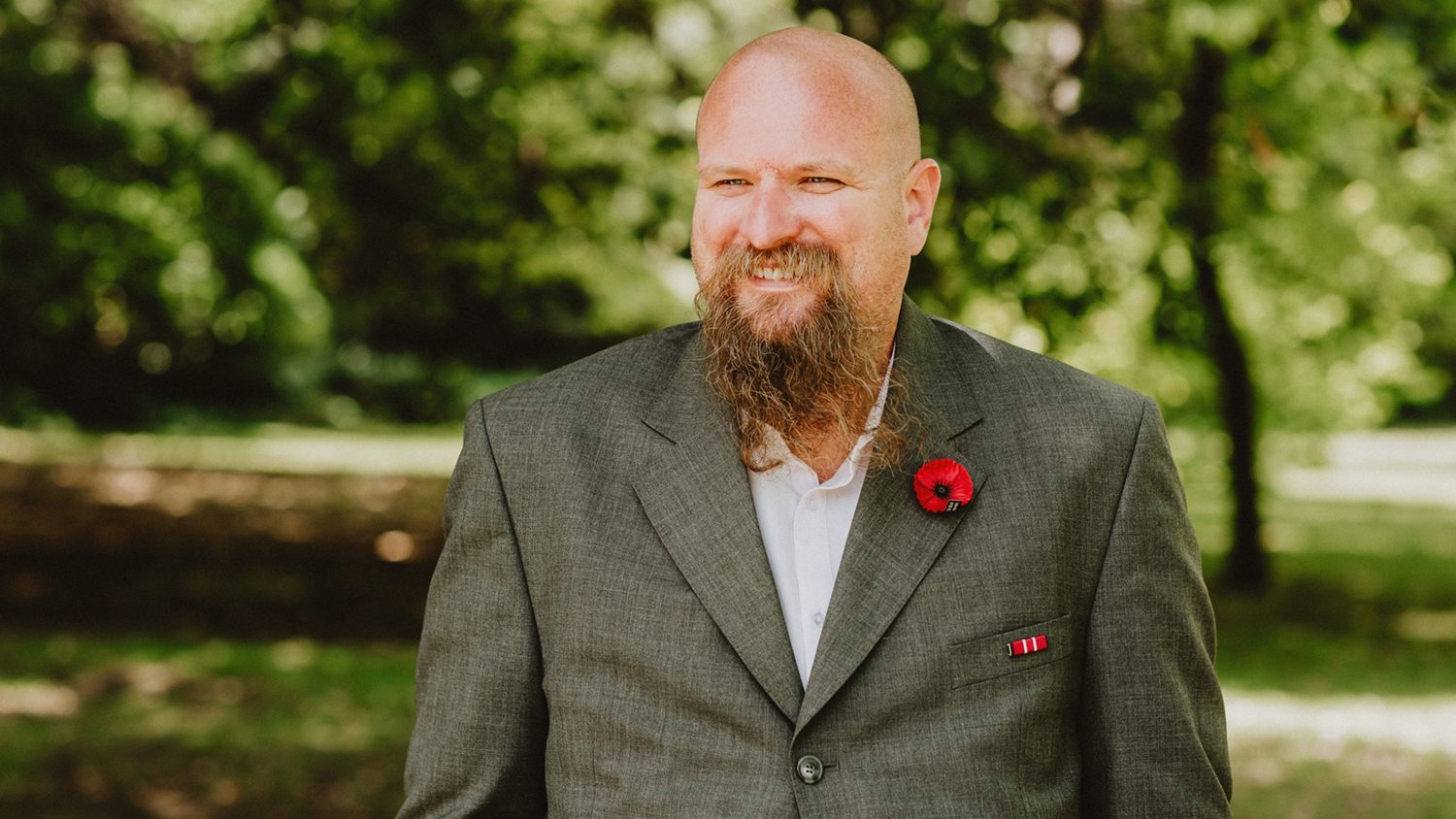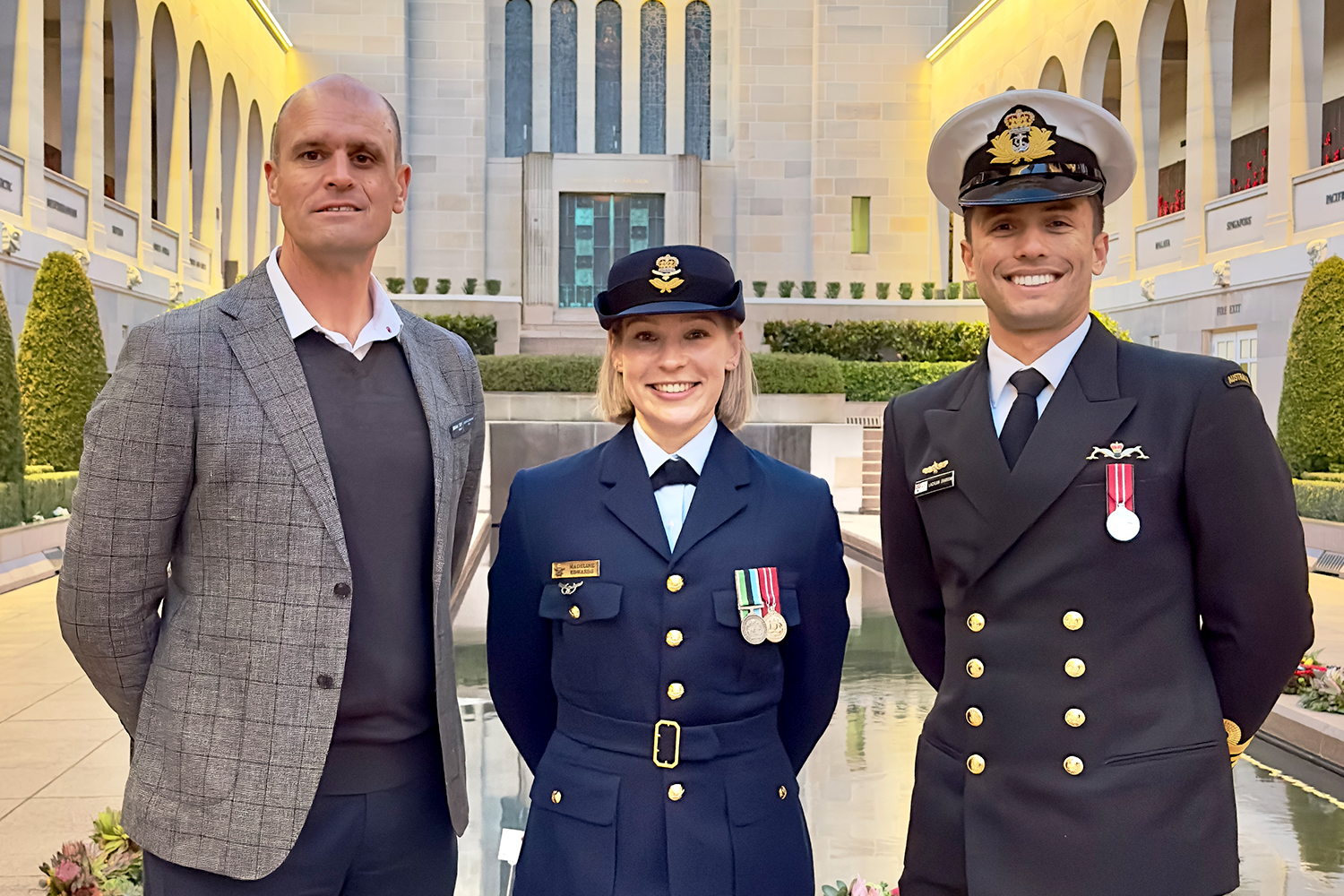Bravery Trust are honoured to hear stories of service and life’s wins and challenges from the veterans we support. We commit to regularly sharing these unique, moving stories with you, beginning with the journey of Jim and Cassie. Bravery Trust captured these wonderful images of Jim, Cassie and their family at The Shrine on Remembrance Day, before they went on to share their powerful story with us. This is the first of two blogs reflecting on their unique experiences.
J: I’m Jim. And this is my wife, Cassie. We met at a tattoo shop, where Cassie was working. We just met and got talking.
C: We were going through similar things at the same time, with break-ups and kids. That was about seven years ago. We’ll be six years married next year.
J: Yeah. Well. Time flies when you’re having fun, as they say. We’ve got three kids. Both of our boys are 12, only a couple of months apart. They’re very similar. One’s a little bit more outgoing than the other.
C: They like play video games together, they play soccer and football, and do judo – stuff like that.
BT: And what do you do as a family together, that you really enjoy?
C: Car events – we collect classic cars like Valiants and we do them up as a family. When we met, it was one of the things we really clicked on.
J: Yeah, it’s a bit of therapy. Doing the cars, it takes the place of work. It gives me something to do and is a type of therapy for me. Pulling them apart is easy. It’s putting them back together again, that’s the hard part.
BT: Can you share the story of your military career with us?
J: I joined the army on the 6th of January 1992. I always wanted to be a soldier, it’s all I ever wanted to be. Since I was five or six years old, I identified that I wanted to be a soldier. Not sure why. I joined the cadets when I was 13, that cemented it for me. I was only 17 when I joined the army. Turned 18 bashing dixies in the mess at Kapooka, cleaning the big pots. It was my 18th birthday party. Then I went to the School of Infantry at Singleton and did IET training. Marched into Enoggera in Brisbane after that. Did Canungra pretty much straight away after that. I went overseas to Brunei for a short trip as a company exchange.
BT: And was it fulfilling?
J: Yeah, very much so. It was very physically demanding. To be able to do all that sort of stuff without being injured, it was a good feeling. It really took the wind out of my sails, being injured. It ended my military career. I went from being pretty much full-on infantry to going into almost a desk job, doing the Intelligence side of it. Because I couldn’t physically do the job that they had me doing prior to that. I got out on the 13th of June in 1997.
BT: And what was the aspect of the career that you found most interesting?
Jim: Travel. It was something that not everyone got to do. There were lots of things I enjoyed, including being away from home. I know a lot of guys got homesick, but I didn’t want to go home. It wasn’t an issue. It wasn’t until I had my injury, then I wanted to go home. That was when it all sort of turned south and went a bit sour. It was like; “I’m done here, I just want to go home and reassess, and start again.”
You feel cut off. You feel very alone. Going back and trying to relate to civilians and become friends with civilians, that was hard. Jim
C: Jim is very loyal, and very protective. That whole “Once you’re part of my family or my close friends, that’s it.” Yeah. You’re always in that group. He’s always there for you. Not that he wants to admit it very often, but he has a very, very kind heart. And he’s always willing to help people. He’s been impacted upon by his injury and time in the military. Jim was out for 15 years when I met him, and he was still very much in a military mindset. And it took me a long time to get used to it. When we’d go places, he’d have to sit in a certain spot, or we couldn’t sit in certain restaurants if he didn’t feel comfortable. Things like that. It took me a long time to get used to, because I didn’t understand it. But once you do, it’s just sort of… that’s him.
BT: How has life been since you left the military, as a family?
J: Hard. When you train to be a soldier, especially an infantry solder or arms corps soldier, you become a different person. The training that you do changes you fundamentally, inside. And when you get out of the army, you don’t do another course to change you back into a civilian. Once you’re a soldier, you’re always a soldier. Once you’re a soldier, you’ve always got that mentality, that mindset. And I think going back into the civilian domain after it was very, very difficult for me. Dealing with civilians, the ethos and mindset of a lot of civilians is a lot different to the guys you’re in the army with. These are guys that you depend on, in some circumstances, with your life – literally. You become very close. The bond and the brotherhood between soldiers is very strong. I can catch up with guys that I haven’t seen for 20 years, and you’re still intensely bonded. And then you get out of the army and all of a sudden, you haven’t got that around you.
So, you search for it in other areas, and then you start making mistakes. You look for it in places that you shouldn’t, like bike clubs. Because you’re trying to replace a unique way of being in the world with something else. That was very hard, and I made mistakes. I got out of the army and I was angry. That whole mindset doesn’t help overall. I’ve calmed down a lot over the years. But when I first got out, I was very bitter. I gave 110 percent of myself – to the point where I injured myself so badly that I’m going to be crippled physically for the rest of my life.
BT: What are some of the emotions ex-service people go through when they’re medically discharged?
J: You feel cut off. You feel very alone. Going back and trying to relate to civilians and become friends with civilians, that was hard. And it’s not their fault, it’s just that they’re different. And they don’t understand our experience. The only people that understand what the military life is like are people who have been through it. I mean, I’ve got civilian friends and that, that are great friends. But they just don’t get me, from that fundamental level.








